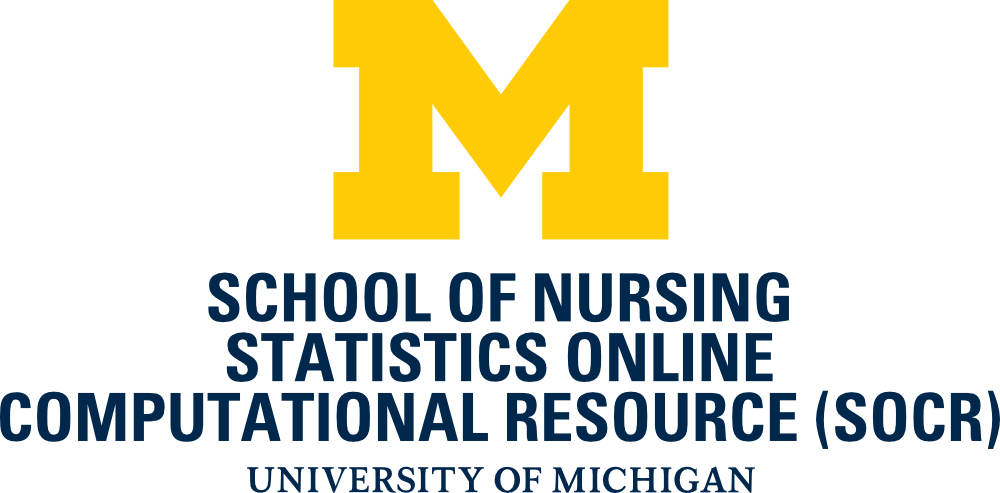Overview
 The Data Science and Predictive Analytics (DSPA) course aims to build computational
abilities, inferential thinking, and practical
skills for tackling core data scientific challenges. It explores foundational concepts in
data management, processing, statistical computing, and dynamic visualization using modern
programming tools and agile web-services. Concepts, ideas, and protocols are illustrated
through examples of real observational, simulated and research-derived datasets. Some prior
quantitative experience in programming, calculus, statistics, mathematical models, or linear
algebra will be necessary.
The Data Science and Predictive Analytics (DSPA) course aims to build computational
abilities, inferential thinking, and practical
skills for tackling core data scientific challenges. It explores foundational concepts in
data management, processing, statistical computing, and dynamic visualization using modern
programming tools and agile web-services. Concepts, ideas, and protocols are illustrated
through examples of real observational, simulated and research-derived datasets. Some prior
quantitative experience in programming, calculus, statistics, mathematical models, or linear
algebra will be necessary.
This open graduate course will provide a general overview of the principles, concepts,
techniques, tools and services for managing, harmonizing, aggregating, preprocessing, modeling,
analyzing and interpreting large, multi-source, incomplete, incongruent, and heterogeneous data
(Big Data). The focus will be to expose students to common challenges related to handling
Big Data and present the enormous opportunities and power associated with our ability to
interrogate such complex datasets, extract useful information, derive knowledge, and provide
actionable forecasting. Biomedical, healthcare, and social datasets will provide context
for addressing specific driving challenges. Students will learn about modern data analytic
techniques and develop skills for importing and exporting, cleaning and fusing, modeling
and visualizing, analyzing and synthesizing complex datasets. The collaborative design,
implementation, sharing and community validation of high-throughput analytic workflows
will be emphasized throughout the course.
Prerequisites
You can view the General DSPA Prerequisites. To ensure students are comfortable in this DSPA course, consider taking the self-assessment (pretest) prior to enrolling in the course.
To summarize, students should have prior experience with college level (undergrad) mathematical modeling, statistical analysis, or programming courses or permission of the instructor. Some MOOCs may be taken as prerequisites, e.g., Corsera, EdX1, EdX2. Additional examples of remediation courses are provided in the self-assessment (pretest).
Course Objectives
Trainees successfully completing the course will:
(1) Gain understanding of the computational foundations of Big Data Science
(2) Develop critical inferential thinking
(3) Gather a tool chest of R libraries for managing and interrogating raw, derived,
observed, experimental, and simulated big healthcare datasets
(4) Possess practical skills for handling complex datasets.
Target Audience
This course will be appropriate for trainees who have significant interest in learning data scientific and predictive analytic methods that can commit substantial amount of time to focus an undivided attention to study, practice and interact with other trainees in the course. Review the DSPA Topics to decide in the course coverage is of interest to you.
Notes
Class notes, datasets, and learning materials will be provided. This course will cover topics like managing data with R, various Learning Classifiers, model-based and model free forecasting and predictive analytics, evaluation of classification performance, and ensemble methods.
Topics Covered
The following topics will be covered in varying degree of depth.
Instructor
Ivo D. Dinov, SOCR, MIDAS, HBBS/UMSN.
Competencies
This course is designed to build specific data science skills and predictive analytic competencies.
Logistics
University of Michigan affiliates can directly register for the course using their UMich credentials and the Enrollment link below. Non-affiliated learners and students outside the University of Michigan need to first obtain a UMich friend account (using an outside email) that can then be used to register for the DSPA course.Time/Place: SNB 1240, Monday and Wednesday 8:30-10:30 AM. Dr. Dinov's WI'18 OHs: Thursdays 9:30-10:20 AM SNB 4126
non-UMich Enrollment » Archived Videos »
UMich Graduate Credit
To obtain UMich grad credit and get a course grade for completing HS650, students must enroll in HS650, through the registrar's office, and complete all requirements in due time. This option is only available to currently enrolled University of Michigan graduate students.Other students, fellows, and non-UMich affiliates can enroll in the DSPA course as a MOOC. Upon satisfactory completion of the course, they may request course completion certificate, see above, but this certificate does not transfer as UMich grad credit (Rackham Graduate School rules). Non-UMich trainees may either apply for (1) admission to a Michigan Graduate Degree program, or (2) for admission as a non-candidate for degree (NCFD) to earn credit for graduate-level courses, including this DSPA Course, see the details here.
Course Management System
DSPA Canvas CMS website provides additional course materials and discussion forums.Acknowledgments
The DSPA course is made possible with substantial support from Michigan Institute for Data Science (MIDAS), Statistics Online Computational Resources (SOCR), the Department of Computational Medicine and Bioinformatics (DCMB), and the Department of Health Behavior and Biological Sciences (HBBS/UMSN).Ideas, scripts, software, code, protocols and documentation from the broad and diverse R statistical computing community have been utilized throughout the DSPA materials.
Many colleagues, students, researchers, and fellows have shared their constructive expertise, valuable time, and critical assessment for generating, validating, and enhancing these open-science resources. Among these are Christopher Aakre, Simeone Marino, Jiachen Xu, Ming Tang, Nina Zhou, Chao Gao, Alex Kalinin, Syed Husain, Brady Zhu, Farshid Sepehrband, Lu Zhao, Sam Hobel, Hanbo Sun, Tuo Wang, Brian Athey, and many others.
Fair Use Licensing
Like all SOCR resources, and to support open-science, these resources (learning materials and source-code) are CC-BY-SA and LGPL licensed.


